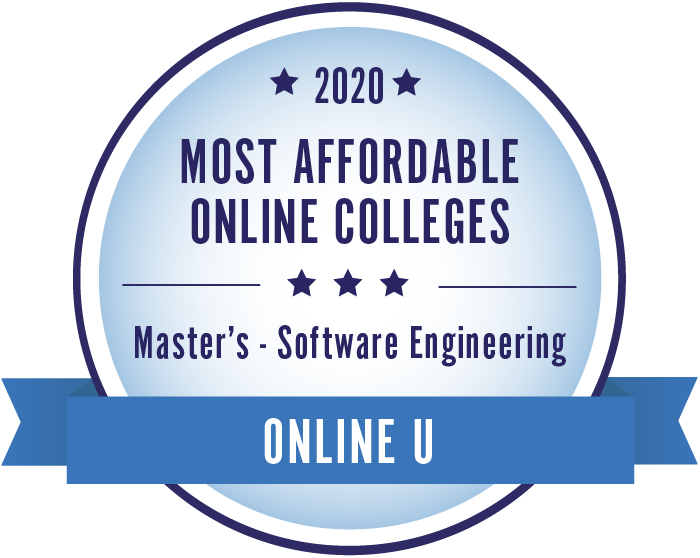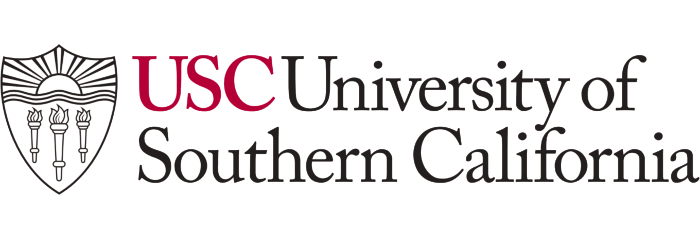Best Online Master's in Software Engineering Degrees

The 4 best value online master's programs in software engineering programs can be found at these colleges and universities. Ranked #1 is Stevens Institute of Technology, with a low tuition of here, and the cost per credit, which is $1,652.00, and found here">$24,780 and a high median salary of $163,500. At #, the University of South Carolina - Columbia has the least expensive tuition on the list, charging only per year for its Master of Science in Software Engineering program.
Alumni salaries were provided by PayScale. View our methodology for more details or learn more about OnlineU.
ON THIS PAGE
Overview Requirements Common Courses CareersIs It Worth It? FAQs
| Rank | School | Annual Tuition | Mid-Career Salary |
|---|---|---|---|
| Stevens Institute of Technology | $24,780 | $163,500 | |
| University of Southern California | $33,200 | $151,900 | |
| Southern Methodist University | $20,250 | $129,600 | |
| Johns Hopkins University | $55,530 | $120,800 |
2020 Online Colleges Offering Software Engineering Degrees - Ranking Details
#1 Stevens Institute of Technology
- Annual Tuition: $24,780
- Median Salary: $163,500
- Locations: Hoboken (NJ)
- Accreditation: MSCHE
Stevens Institute of Technology offers a Master of Science in Software Engineering with a concentration on building software systems that improve and advance an increasingly interconnected society. The 30-credit hour curriculum includes coursework in software architecture and component-based design, methods of software development and software testing, and quality assurance and maintenance. Students of the online software engineering degree graduate with the advanced knowledge and skills necessary to pursue careers in the role of a software engineer, software developer, requirements engineer, or application developer.
#2 University of Southern California
- Annual Tuition: $33,200
- Median Salary: $151,900
- Locations: Los Angeles (CA)
- Accreditation: WSCUC
The Master of Science in Computer Science (Software Engineering) offered at the University of Southern California provides students a broad and advanced education in the discipline and industry. The 32-unit degree program concentrates on both the fundamentals of software engineering and customer collaboration and management. Curriculum coursework includes agile methods, high assurance, software-intensive systems, COTS integration, and rapid software development and evolution. Graduates of the online software engineering degree are well qualified to enter or advance a career in software design, information technology, communications, and government security.
#3 Southern Methodist University
- Annual Tuition: $20,250
- Median Salary: $129,600
- Locations: Dallas (TX)
- Accreditation: SACS COC
The Master of Science in Software Engineering offered at Southern Methodist University provides students a balanced education in both the technical and management elements of the discipline. The 30-credit hour program follows the curriculum proposed by the Software Engineering Institute, making certain the coursework and instruction are relevant and applicable to current practices in the industry. The online software engineering degree courses include software testing and quality assurance, advanced application programming, software generation and maintenance, and user interface design.
#4 Johns Hopkins University
- Annual Tuition: $55,530
- Median Salary: $120,800
- Locations: Baltimore (MD)
- Accreditation: MSCHE
Johns Hopkins University offers two online master’s in software engineering degrees. They have a Master of Science in Computer Science (MSCS) and an MS in Information Systems Engineering (MSISE). Both degrees offer a focus area in Software Engineering. These are non-thesis programs that require ten courses to be completed in five years, although most students finish faster. Terms are 14 weeks, and students spend approximately 10 hours of work per 3-credit course. There is no required day or time to log in for classes, although some professors have optional, weekly live office hours. Though classes are not live, they are highly interactive and incorporate hands-on, project-based learning that is immediately applicable to real-world situations. Professors are renowned applied scientists and engineers, and the program format fosters collaborations and networking on a global scale. Online MSCS and MSISE students have support services comparable to on-campus grad students. These include student email, financial aid, the online bookstore, academic advising, live library support and digital library, career placement assistance, technical support, and mentoring.
Overview of Online Master's in Software Engineering Degrees
Online programs in software engineering are a convenient way to earn a graduate degree in a field you're already familiar with and enjoy. In addition, you can study as your calendar allows, which can be beneficial if you already juggle a full schedule. Programs usually take around two years to complete and require an average of 30-36 semester credit hours, though an accelerated degree program may only take a year.
You can gain advanced skills in software processes, including software testing, algorithms, and architecture, while earning a competitive edge among your peers.
A master of science in software engineering can help prepare you for a job in software engineering management by helping to equip you with the knowledge necessary to lead various types of projects and teams. You can gain advanced skills in software processes, including software testing, algorithms, and architecture, while earning a competitive edge among your peers. However, deciding whether an online master's in software engineering degree is right for you takes thoughtful consideration.
Still unsure whether you want to pursue a master's in software engineering? Check out similar online degrees in computer science, data science, and information technology.
What Are the Requirements for a Master's in Software Engineering?
Prospective master's students in software engineering typically must have a bachelor's degree in software engineering or a related STEM field, such as mathematics, engineering, physics, or computer science. However, a student may be able to gain admittance to a master's program with an unrelated bachelor's degree if they have appropriate experience. An admissions advisor can help determine how your previous college and work experience may apply toward admission requirements or what prerequisites you need before enrollment.
In addition, the admissions process for a software engineering graduate program generally requires the following:
- A completed application and fee of approximately $60
- Official college transcripts and military transcripts, if applicable
- A GPA of 3.0 or higher
- Two letters of recommendation from employers, professors, or industry professionals
- Entrance exams including the Graduate Records Examinations (GRE) if you are planning to attend full-time
- A letter or essay of intent
- Your resume or CV
What Courses Will I Take in a Master’s in Software Engineering Program?
Core and elective courses in a master's in software engineering degree program support an advanced curriculum focused on developing leadership, project management, and new technology skills such as those in artificial intelligence. The knowledge you gain through these classes will help to prepare you for your capstone project before you graduate.
While software engineering course titles may vary from school to school, learning outcomes are similar across programs, enabling you to cultivate a more competitive skill set.
Agile Methods for Software Development
This course examines agile methodologies — a collaborative, cross-team approach to delivering value to customers — including Scrum, Lean, Crystal, Dynamic Systems Development, Extreme Programming (XP), and Feature-Driven Development. Coursework, case studies, and software development projects help graduate students develop an understanding of agile development principles and techniques of the entire software development process.
Cost Estimation and Metrics
Instruction is designed to address software project management through the use of objective metrics used to help software engineers understand the scope of work of a software project, including necessary tasks, availability of resources, potential risks, and scheduling. Lessons also introduce students to industry-standard software cost estimation tools such as COCOMO II.
Software Acquisition, Legal, and Economic Issues
Learning outcomes include an understanding of the software procurement process, including contract law, specification, and control of product processes. Topics may include cost estimation techniques and models, cost-benefit and risk analysis, and related legal implications.
Software Reliability and Safety
Discussions include the in-depth study of techniques for ensuring software reliability and safety and may include software reliability engineering, safety engineering, applying reliability concepts to the software domain, and applying safety concepts to computer-intensive systems. Discussion may also address reliability models and analysis models, operational profiles, fault and event trees, and formal verification for safety-critical software systems.
Software Generation and Maintenance
Lessons enable students to examine techniques for generating software and maintaining revisions to existing software and may include coding alternatives, program generators, high-level programming languages, CASE tools, and component reuse. Students may also study software evolution maintenance, software re-engineering, and release cycle planning.
What Can I Do With a Masters in Software Engineering?
If becoming a software engineer is your career path and earning your graduate degree interests you, you may choose to work on web-based software or mobile applications, with data and databases, or with network systems after you graduate. Several career options are available within each of these disciplines, anticipating higher than average job growth at 19% through 2030 as the U.S. Bureau of Labor Statistics (BLS) projects. In addition, jobs for software engineers typically pay much higher than the national average for all jobs.
The BLS anticipates 22% job growth, significantly higher than the average 7.7% for all occupations.
For example, you may work as a software developer, quality assurance analyst, or software tester. These are some of the highest paid of those working in software development, earning median annual salaries of $110,140 — the highest 10% make more than $170,000. The BLS anticipates 22% job growth, significantly higher than the average 7.7% for all occupations.
Is a Master’s in Software Engineering Worth It?
A master's in software engineering may be worth it if you are interested in career growth or it's an employment requirement. Earning your master's can help keep your skills fresh and relevant while increasing marketability. However, it's not always a requirement, and you'll want to thoroughly investigate your career options with and without a master's degree before pursuing your graduate degree.
Other factors to consider include the expense of a master's degree, the time it will take to finish school, and if its pursuit aligns with your career goals. To help make your decision, you may want to consider the following:
You probably have a well-developed skill set if you've already been working as a software engineer or developer. While you can gain additional skills through an advanced degree, you may want to ask yourself if these can only be acquired through formal education or if you can gain them on the job. You may also want to consider earning a graduate certificate in software engineering, which may take less time and money.
A master's degree can cost you thousands of dollars, especially if you don't qualify for financial aid. Will the money you may eventually earn make up for your investment in school? Or, if you're already making a high salary, will it be worth the money and effort, especially if you incur student loan debt?
It takes about two years to earn a master's degree in software engineering — if you can attend school full time. It will take longer if you work, have numerous obligations, and are a part-time student. You may want to consider if you'll be able to stay motivated, if you can take on more work, and where your education will fit in with the rest of your life. Or, you may want to consider an accelerated degree program. However, remember that while an accelerated program goes faster than a traditional one, it can also be more intense.
FAQs About Online Master's in Software Engineering Degrees
What Is the Difference Between a Master's in Software Engineering and a Master's in Computer Science?
A master's in computer science provides a broader overview of the technology and how computer systems work. While software engineering is a part of this, a master's degree in the subject is narrower in scope and focuses specifically on software design, development, and implementation.
Is a Master's in Software Engineering Hard?
Any degree in the STEM field may be difficult because of the nature of what you'll be studying, but it can be done as long as you find interest in what you are doing and it brings value to your career. Being organized will be critical, as will dedicating yourself to studying, completing your assignments on time, and asking for help when needed.
How Long Is a Master's Degree in Software Engineering?
It generally takes full-time students two years to complete a master's degree in software engineering. However, schools may offer accelerated degree programs that take approximately one year to complete.
Do I Need a Software Engineering Master's To Get a Job in Software Engineering?
You don't necessarily need a master's degree to get a job in software engineering — you usually only need a bachelor's. However, the BLS notes that some employers may prefer master's degrees. Therefore, it's best to research companies you may be interested in working for to find out what they require.
Related Articles
2023 Best Online Master's in Computer Science Programs
Compare the best online master's in computer science programs and learn about the degree prerequisites, curriculum, and career opportunities for graduates.
By OnlineU Staff Writers | 2/6/2023




